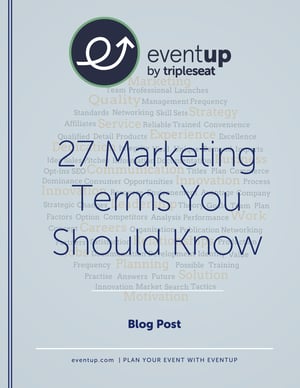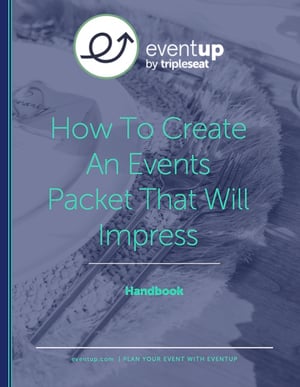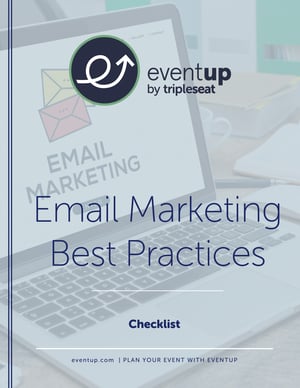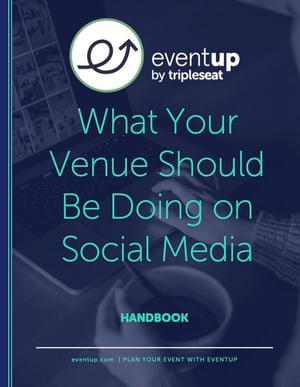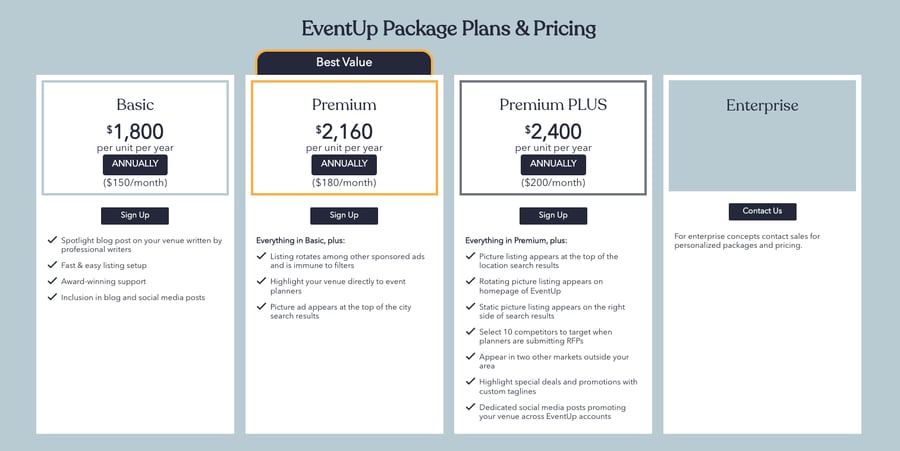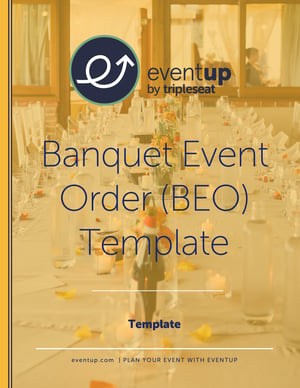The Ultimate Guide: How To Market Your Venue & Private Events Business
For any restaurant, hotel, or unique venue wanting to increase its brand awareness and visibility with planners in order to secure more private events, this is a must-read guide.
Table of contents:
- Why You Should Market Your Event Space and Venue
- Marketing Terms You Should Know
- The Different Venue Marketing Channels
Free events resources:

Folks can stumble upon your website or social accounts. Maybe someone is doing preliminary event research, looking for local venues, or searching for a cuisine type in your area. These people might be curious about event spaces, but more often, they are looking for your menu or to make a reservation; they’re not actively searching for a venue to host an event happening in the near future.
Letting the world know that you host private events at your venue must be a focused and specific marketing campaign. Planning an event is a longer process than simply making a reservation - planners are looking for much more detailed information, photos, and an ongoing relationship with an event manager they can trust.
Hosting private events at your venue can make up to 30% or more of the total venue revenue because of the upcharges, room fees, and other revenue-driving services that social and corporate planners are willing to pay. This revenue can help with cash flow by requiring a deposit and allows you to staff and order food more accurately, knowing menu selections weeks in advance.
Thinking about how you are going to market your venue and event spaces must be top of mind if you want to increase your overall revenue. If you want your events calendar to be booked month after month, planners need to know that you are open and available to host events.
Before we break down how to market your venue or what channels you should consider for your marking plan, let’s break down a few marketing terms that will help you get into the game.
Here are six marketing terms to help you identify the right materials and plans needed to market your venue and event spaces better and to answer those questions such as “What’s really the difference between an impression and a pageview?”
Here are 6 Marketing Terms You Need To Know To Market Your Venue
1. ContentInformation about your venue, space, and offerings packaged into easy-to-consume formats. One thing to note, content is not always just written information. Engaging content can be photos, videos, or quotes from staff or guests, and this content can live in many different places.
Marketing Example: Information, photos, and/or videos that you would write in a blog post, email, newsletter, or social post.
2. Gated ContentAny type of marketing content, such as downloadable pieces, videos, templates, or secret sections of a website, that lives behind a “gated wall” that requires a form-fill in order to gain access to it.
Marketing Example: Longer pieces of content, such as an events brochure, tasting menu, or pricing packages, should be gated and only give access to those who fill out a form.
3. Call-to-action (CTA)A link or button that will continue the journey or offer a next step for the reader on a piece of content.
Marketing Example: People often use, “Read More,” “Download Now,” or some other text that encourages an action at the bottom of an email, in a social post, or on a landing page.
4. LeadA person or group who has positively interacted with your venue that you can connect with via email, phone, or social media in hopes of growing or expanding the relationship. Turning a lead into a customer is often referred to as a converted lead.
Marketing Example: A contact has filled out a form on your website, and you can now send them email promotions.
5. Page viewA page view is when a contact views 1 page of your website or blog.
Marketing Example: If a visitor comes to your website, visits your home page, then clicks on the events page, and reads through your offerings. That one contact will record 2 page views in your reporting.
6. ImpressionsAn impression is when an element on a page is viewed. Typically impressions are used to discuss analytics of ads or an element on a page.
Marketing Example: If you embed a video on the homepage of your website, you will want to track how many impressions the video generates. If you compare that to your page view numbers, you can calculate if your visitors watch the video more than once.
What's really the difference between an impression and a pageview? Explore all 27 marketing terms you should know!
There will be different channels or types of marketing that you will want to build to connect with past and potential customers.
The four most common marketing channels that are important for your venue to actively update and post to are:
Venues WebsiteEmail marketing
Social media marketing
Venue marketplace
Your Venue’s Website
Your venue's website is the most important location to showcase your events program. This is where most planners will first look for information about your venue, what packages you offer, and photo albums of previous events you have hosted for inspiration. Your website is the home base that almost all of your marketing efforts will point back towards; falling short on your homepage is a huge missed opportunity to impress planners and convert them into customers.
There are three main components that your website should include to properly attract and convert the event planner website visitors into customers.
Your website should include
1. A dedicated private events page or section of the site that highlights your events program
2. A form to collect event leads
3. An events packet that planners can view or download
1. Private Events Page
We know that your website is a fantastic tool to get your venue found by event planners — but when it comes down to decision-making time, planners may look to your website to get the full picture of what you offer.
The great thing about this is that your website is your venue’s domain to add whatever information you want, as well as being able to update it as frequently as needed.
You will want to create an entire page dedicated to only your events program. Planners will want an area that feels customized to their needs and goals.
What to include:
The types of events or celebrations you accommodateList out the different rooms or areas that can be rented with a picture-perfect description
Include what amenities, furniture, and packages come with each room or event booked
Food and beverage options, either in-house or preferred vendors
Photos, photos, and more photos
A clear way to connect with you
Cannon Green in Charleston, South Carolina, has mastered the private events page. From the beginning of the online experience, it is clear what section I need to visit based on the event type I am looking to plan. From there, each page is detailed with just the right amount of information to get started on my space journey.
They clearly list out what is included, how many guests fit in each space, and what the culinary experience will feel like, and they provide detailed brochures and planning guides.
Overall the experience on the Cannon Green website is helpful without being overwhelming. The photos they have selected are romantic, whimsical, and refreshing. It truly makes me excited to plan a wedding since I already get an authentic feeling from the thought and care they have built into this site.
2. Form to Collect Event Leads
To grow your list of potential customers, you want to collect the contact information of those planners or couples interested in your venue. Once you have their information, you can then call and email them to highlight new features and promotions, sell them on your space, and turn them into customers.
Only some people who visit your website or even provide their contact information to you will turn into customers. However, the more contacts you can collect through the form, the higher the percentage of customers you can convert. Having a helpful and inspirational events packet will only help you collect more event leads through your website form.
You position the form as an event inquiry for an immediate conversation around a specific event they are planning or use the form for people to download for information about your venue.
3. How to create an events packet that will impress
Your private events packet is an extension of the information found on your website. In the packet, is where you will go the extra length on the details, cost, and how the relationship between venue and client will work. Planners will download the events packet from their favorite venues to compare exactly what they get for the cost.
The events packet will also be shared with family, friends, or coworkers who will help in making the final decision. So even though the packet will be lengthy with lots of specifics, you still want the packet to have the same aesthetic and photos that your website provides. Key information you should include in a packet are:
Spectacular photosUpdated information (pdfs allow information to be updated in real-time vs. printed kits)
Highlight floor plans and fact sheets, including sizes
Highlight any preferred vendors
Leverage past event clients
Include sample menus
In this Handbook, we've got expert tips, quotes from industry pros, and helpful ideas that will allow you to create a stellar private events packet that stands out.
10 Best Practices That Will Make You an Email Marketing Pro
If you’re doing any kind of marketing on behalf of your restaurant, hotel, or venue, you know that email marketing is still a very relevant and very effective marketing tool. That means that you also know that your customers and prospects are not only getting emails from you. Their inbox is filled daily with information and offers from all the businesses they interact with.
To grab attention and encourage action from your audience? We’ve put together a list of 10 email best practices that will get you results:
1. Create a compelling subject line and preview textThis is the first thing a reader will see in regard to your email and can determine if they will click open or delete. A well-thought-out subject line should provide enough information so the reader knows exactly what to expect when they open your email, yet leave them wanting more so they’ll take the time to open the email. This is a lot to ask of about 50 characters.
The preview text is basically an extension of the subject line that will appear in the email inbox. If left untouched, the preview text pulls in the first line of text in the email, which is typically, “Having trouble viewing this email? Click here to view as a web page.” You don't want to start off on a negative note; the preview text is 50-100 characters of free real estate, allowing you to extend your subject line or give a short description of the email.
How to create a compelling subject line and preview text:
Send emails from a real person, with their name as the sender and the from email. If the email’s coming from Tom Jones, the email should be something like TomJones@venuename.com.
Keep it short, simple, and to the point. If the text is too long, it will get cut off, and your readers might not be motivated to open the email and learn more.
Include numbers, questions, or emojis to get readers’ attention.
Use verbs to help readers picture the action you want them to take.
Create a sense of urgency by including deadlines or phrases like “limited-time offer.”
Give your subject line a re-read; nothing says spam like a typo.
2. Include a value proposition
This is the big "why." Why are you sending this email to this group of people? Why do those people want to read the email? Say it in words and include a call-to-action, as well as a way to take that action, such as a link or a button — an example would be something like encouraging your readers to schedule an event. Use words like “Click Here to Book Now” in a text link or a button that links to your lead form.
Your value proposition should be located at the top of the email. It should be short and to the point. If the main message is unclear to the reader or too far down the email, they will stop reading and just delete it. Or even worse — hit the spam button.
3. Pay attention to visual designHow your email looks is just as important as the content, and it’s one of the first things your audience notices when they open your message because people process visual design faster than text. Keep these visual design tips in mind:
Brand colors: Create branded emails that use your company logo and color, and be consistent with the design. Your emails should look like they are from you and spark instant visual recognition from your customers.
Images: Include visually interesting, relevant images representing your topic and catching your reader’s eye. Your emails are being sent to people who are busy and receive many emails daily. A good image will make them stop scrolling and start reading and clicking.
White space: Use white space wisely. White space is a great way to separate different sections of your email, but don’t overdo it. Too much white space will make your email longer, and your readers might get tired of scrolling.
Bullet points: Break up your information with bullet points. Sharing three to five high-level points makes the email easier to scan and can tease the reader enough to make them want to learn more and take action.
Personalization: Connect with your readers on a personal level when you can. Use features like a custom greeting that pulls in names from your database and addresses your email to the individual (make sure your database is free of typos and uses capitalization correctly). Create lists for people interested in different topics or services and send them emails with news or offers for their interests. Consider mentioning a recent visit or download, or customize landing pages based on content offers.
4. Maintain a clean database
Before you even sit down to write that next email, your database of names needs to be clean. By clean, I mean get rid of the following types of contacts that aren’t going to open your emails and will do nothing to increase your open rates:
Contacts with fake or false dataUnengaged contacts — people who never open your emails
Unsubscribed contacts — this is actually a mandate of the federal CAN-SPAM Act. Businesses must honor recipients’ wishes to unsubscribe from their email list and must include an opt-out link in their emails. California, Canada, and most of Europe have additional strict regulations.
Scrubbing these names from your email list or even deleting these names from your database altogether will improve your overall deliverability rates, open rates, and click rates.
5. Create segmented email listsNot only does your database need to be clean, but you also need to make sure your database has been organized into groups of like people or segments so that you can properly send the right message to the right people. Some basic segments can include type of event held in the past or inquired about, customers, prospects, geography, different types of marketing efforts, and interests.
6. Build a content calendarHaving an up-to-date calendar that shows your email schedule and the topics that you want to cover sets you up to be proactive versus reactive. A calendar is also a great way to make sure you’re sending emails at the right frequency and planning the perfect timing to allow readers to take advantage of offers or information you share.
Creating emails that relate to upcoming holidays, seasons, popular sporting functions, or even pop culture can boost your open rates and your revenue. Use these themes to your advantage by promoting your venue’s specials or offers. And don’t forget to include it in your subject line to keep it timely. An example like “Start the Year Off Right” in January will make readers think about their plans for the new year.
7. Analyze your dataPay attention to your email reports for every email that you send. Does your audience prefer CTA buttons or hyperlinks? Do they like images or mostly text? Short or long text? Do emojis in the subject line work? The data on your opens, clicks, popular links, and more will give you the answers to these questions and reveal trends and preferences. Look for peaks and valleys in your data to guide you on how to make improvements to your email marketing and create successful emails. You should spend just as much time analyzing the data of past emails as you do crafting your next one.
8. Test, test, test!Create tests that compare one slight difference between two different emails. Send one email to a portion of your list and the second email to the rest, and then check your reports to see which email got the better results. This is called an A/B test. You can test colors, images, writing styles, subject lines, or email templates. The possibilities are endless. Emails that look and sound the same month after month become stale and will only be ignored and deleted. What worked last year, last month or even yesterday may not work tomorrow. Trends evolve and change, and you need to stay up to date on what your unique audience resonates and connects with. Test, test, test, and analyze the results.
9. Do your researchDon’t do your marketing in a bubble by focusing only on your department or venue. Ask these questions: What's going on in your organization that your contacts or future customers would care about? What are other organizations in your industry talking about, should you join that conversation? What are your competitors doing, and do you do it better? What are other industries doing that could be incorporated and tested in your emails? Inspiration is all around you.
10. Know the legal guidelinesYes, there are rules and regulations that must be followed (and expensive penalties when not) when sending emails from businesses. These regulations are designated by the CAN-SPAM Act, CCPA, and GDPR. This list does not cover everything, and it is always best to consult your legal team for compliance guidelines for your specific situation, but here are some basic must-dos:
Your business’ physical address must be present in the footer of the email
A link to manage email preferences or to unsubscribe from your emails must be provided in the footer of the email and adhered to
Your business should gain consent from contacts prior to sending them an email, which means the contact knows that they will be receiving emails from your organization
Requests from recipients to delete personal data must be completed within 30 days.
Download the Email Best Practices checklist. We cover 10 best practices that will make you an email marketing pro!
Social media platforms are interactive technologies where you can connect and interact, share, and exchange content with a virtual community. There are over 3 billion people across the globe who use social networks, and on average, they spend 2 hours
and 25 minutes on them every single day, according to Statista, which
specializes in market and consumer data. People are spending more than 16 hours each week connecting with one another and brands through their social accounts, so not being active on social platforms and having a marketing plan is no longer an option. You'll need to show up where folks are gathering and introduce yourself and your venue.
People are so invested in their social media presence that they expect their brands to post several times a week. Many brands event post several times a day. People are looking for constant and current information to engage with.
In today's current climate, it is more important than ever for guests, customers, and potential customers to know exactly what restaurants and venues are open, how they are serving the community, and the venue's safety protocols so that guests can decide if they feel comfortable visiting an establishment or planning a future event with them.
Social Media Platforms That Are Perfect For Venues
These are the three social media platforms that every venue should be active on. Here is our formula for picking the following three platforms.
High activity the right audience hosts multiple types of content the perfect social platform.
They are among the most used social platforms, plus you can post various types of content, making them the perfect platforms to see the most return on investment (ROI) in terms of manpower as well as anything paid.
Close to 3 billion people globally use Facebook on a monthly basis. Almost everyone you know is on Facebook. It’s a mix of generations ranging from generation alpha all the way to the silent generation, using the platform and engaging with a wide variety of content types. It’s the perfect platform to start with. You can connect with folks looking to plan 21st birthday bashes and then their parents looking to plan retirement parties, all in a day's work. Facebook also offers ample space to write about your company information, hours, and more.
At almost 1.5 billion users a month and folks literally spending hours of their day scrolling through photos and videos, it’s a great platform to connect with gen z-ers to baby boomers. You will want to spend more time creating engaging, meaningful content for the sophisticated user that won’t be swayed easily by a simple ad.
You can learn more about what your venue should be doing on Instagram.
The 850 million users of LinkedIn tend to lean towards posting and consuming more corporate content. However, with more folks working either 100% remotely or hybrid, the platform is gaining traction on the social side of people's lives. Since it does lean more corporate, it’s a great platform to connect with those corporate planners that are either dedicated to planning customer-focused corporate events or are simply helping out to plan a corporate event for coworkers.
You can learn more about what your venue should be doing on LinkedIn.
Here is a list of additional social platforms to think about creating accounts for your venue if you have the manpower to manage them and a content creator who can consistently create the type of content that works best: YouTube, TikTok, Snapchat, Twitter, and Pinterest.
Only join social platforms that meet the perfect social platform criteria, that you know you have a team member to manage and create content on a weekly basis.
People spend more than 16 hours each week connecting with one another and brands through their social accounts, so not being active on social platforms is no longer an option. Download the Social Media Handbook.
Online venue marketplaces are the ultimate way to connect professional and social event planners with the right venues. EventUp by Tripleseat, the leading global venue marketplace, provides social, corporate, and wedding planners with an easy tool to search for restaurants, hotels, or unique venues in any desired city. With advanced filters, planners can narrow down to only those venues that can accommodate their event's needs by budget, guest count, amenities, price, and much more.
Why your venue should join a marketplace.
Gain exposureBoost qualified leads
Build online presence
Grow with premium listings
Increase venue credibility
Your EventUp listing URL can act as your general form
Maximum venue exposure
Even the best community outreach or well-planned email and social media marketing strategies can't compete with an established online directory. Adding your venue to one of these sites is a great "work smarter, not harder" method. It will allow you to reach a whole new grouping of potential customers just by having a profile. Millions of qualified leads visit these sites to browse and identify the right venue for their event or private dining needs.
Qualified event leads
Folks can stumble on your website for many reasons; most will be looking for your menu or a way to make a simple dinner reservation. However, planners browsing and researching while on the EventUp directory are actively trying to find THE venue for a specific upcoming event or celebration. Both social and corporate event planners prefer using a directory over traditional search engines because our advanced filters do all of the hard work for them. The directory only shows those venues with the exact amenities, style, and price point that fits their needs.
Online presence
In today's events industry, the internet is where people find venues. Thus, the more of a presence your space has online, the better. It's crucial that your company website and social
media profiles are properly maintained and regularly updated. But outside of that, having a strong online directory profile only makes your event venue easier to find and book.
Premium EventUp listings packages
On the EventUp marketplace, we offer three premium package options that allow you to choose the level of exposure, site placement, and additional marketing initiatives depending on your venue's marketing and budgetary needs.
Venue credibility
These days, word-of-mouth marketing and positive online reviews are huge driving factors that determine whether or not a prospective event client ends up signing that contract. People want to work with a business that they deem trustworthy. That's where online marketplaces come in. It's wise for venues to encourage happy event customers to leave positive reviews (and even offer incentives like a discount or limited-time offer if you want to sweeten the deal) to strengthen your brand's credibility where it matters. These positive reviews can be added to your listing so planners can read them while browsing.
Why your venue should join a marketplace - Download the complete guide here!
Your EventUp listing URL can act as your general form
The more places that you can share your EventUp listing link, the more exposure you gain, which drives traffic, and, ultimately, new leads. On the EventUp blog and social accounts, we are always sharing and featuring EventUp venues as these promotions help to drive new business back to you.
Sharing your EventUp listing link on your website and in your marketing efforts also helps with search engine optimization (SEO) and overall Google rankings. With both EventUp and your brand sharing the same link - it creates backlinks from one brand back to the other brand. These backlinks inform the Google algorithm that our brands trust and support each other, which further increases the chances of appearing higher in Google search results. The higher you appear in the search results, the more exposure you gain therefore driving even more traffic and leads.
Every listing on EventUp.com has the ability to view and respond to messages that have been sent to them through their EventUp listing portal. All responses in each conversation are saved, along with the basic event details and venue listing. Once you have a signed contract back from the planner and officially book the event, you can file that message or lead under 'Booked Messages.' There is also an Archived section for any leads that may have yet to pan out. Filing your leads cleans out your inbox and always keeps you organized and on track. You can organize all of your event leads easily in the EventUp portal by using your listing as your main point of lead collection.
Once you start collecting leads within your EventUp portal - you will need a contract to solidify the event details, staffing, pricing, and billing information. That’s where a banquet event order (BEO) comes in.
A BEO is a document or contract for how an event, large or small, will be executed at your venue.
We've created this BEO template for you to use instead of having to re-create the wheel for every event you host. This template is easily customizable for your venue and event needs. Download the BEO Template.
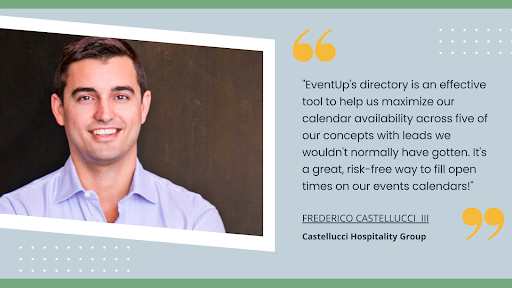
Collect more qualified event leads with an EventUp listing
Connect with millions of social, corporate, and wedding planners to drive revenue and grow your events business.
EventUp by Tripleseat is the leading global venue marketplace. With more than 15,000 restaurants, hotels, and unique venues supporting any event type, EventUp is the #1 place for event planners to start their search. With 5 million searches from Social, corporate, and wedding planners started on EventUp annually.
Schedule a demo today to see how EventUp can help your venue.


